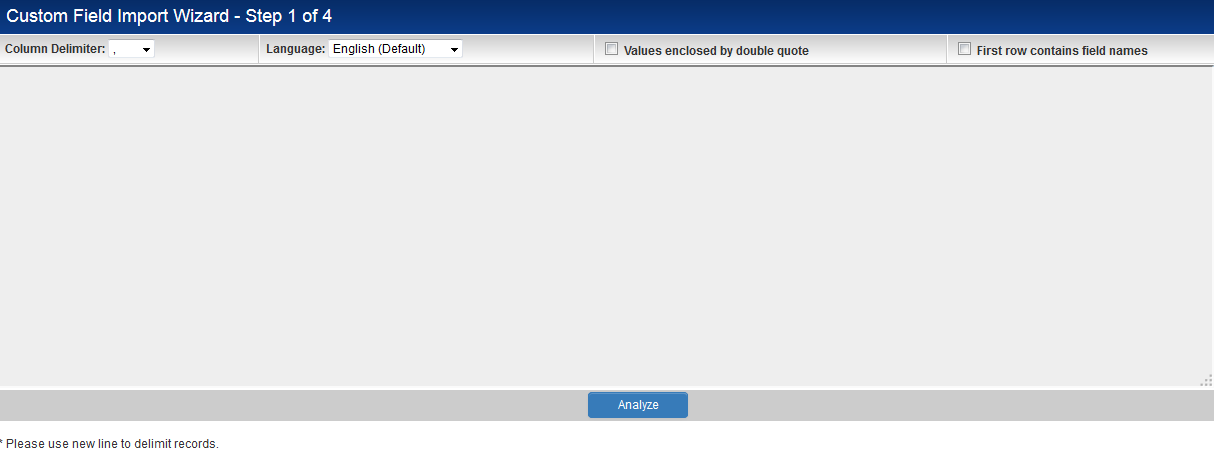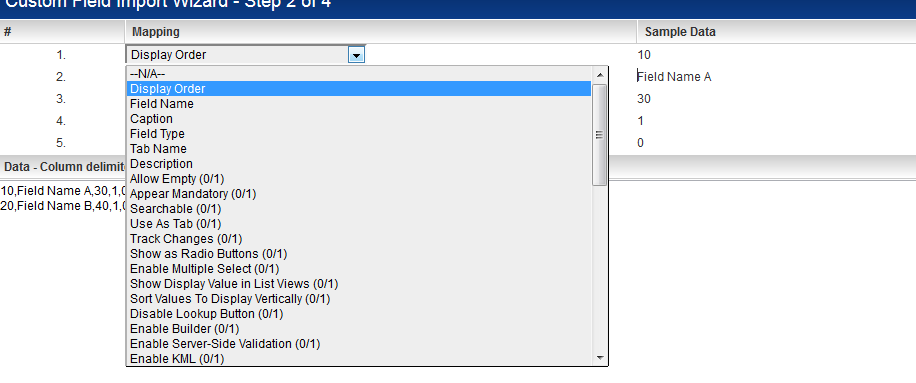Custom Field Import Wizard
System Administrators are able to import custom fields and associated settings within any Custom Field Settings page.
Each Custom Field settings page, whether UTA, contact or company specific, will have the Text Import tab.
Contents
Overview of how to use Custom Field Import Wizard
The import process consists of the following steps:
1. Enter information into the Import Wizard.
2. Map the fields in the pasted data to custom field settings.
3. Validate the information mapping before uploading.
4. Upload the data to SmartSimple.
Enter information into the Custom Field Import Wizard
- Click on the the Text Import tab within the relevant Custom Field settings page, whether UTA, contact or company specific, to access the Import Wizard screen. Step 1 of the Import Wizard is displayed.
- If you wish to paste text into this field then click the mouse in the import text box, and then select the Edit Paste menu or press Control + V. Alternatively you can type directly into the field.
- As a minimum requirement you should enter a Display Order value, a Field Type and a Field Name value.
NOTE: Some of the Custom Field settings can only be imported using IDs rather than the displayed values. These are discussed further in the Custom Field Settings section below.
- Once all the relevant field data is enter then you set the Column delimiter as required.
- Click the First row contains field names check box if the first row is column headers rather than real data.
- Click the Values enclosed by double quote check box if the first row is the values being imported include any that are enclosed in double quotes.
- Click the Analyze button.
Map the fields in the pasted data to custom field settings
- Step 2 of the Import Wizard should now be displayed.
- The top of the screen includes an option to map each column in the entered data with a corresponding custom field settings.
NOTE: Only the first row of data is used to define the mappings, but the settings are applied to all rows of data.
- Define the mappings between the entered data and the custom field settings as appropriate.
- Click Parse Data button at the bottom of the screen.
Validate the information mapping before uploading
- Step 3 of the Import Wizard should now be displayed.
- This lists all rows of data and shows what values are to be mapped to what custom field settings.
- Review the data to confirm that mappings are correct for all rows.
- If issues exist in the mappings then use the Back button to navigate back to an earlier step and make appropriate changes.
Upload the data to SmartSimple
- If no issues exist then click on the Upload button.
- User will be taken to Step 4 of the Import Wizard, which indicates whether the upload succeeded or not.
Custom Field Settings
Some of the Custom Field settings can only be imported using IDs rather than the displayed values. These are discussed further in the sections below.
Settings requiring a 0 or 1
A number of the custom fields settings are enabled using the numeric value "1" and disabled using the numeric value "0".
The exact list of these field settings are shown below . . .
- Allow Empty
- Appear Mandatory
- Searchable
- Use As Tab
- Track Changes
- Show as Radio Buttons
- Enable Multiple Select
- Show Display Value in List Views
- Sort Values To Display Vertically
- Disable Lookup Button
- Enable Builder
- Enable Server-Side Validation
- Enable KML
- Disable Quick Edit
- Hide Field
- Hide For Portal
- Enable Map Service
- Enable People Search Service
- Enable Organization Search Service
- Show Counter
- Count Words
- Show Currency Format in Edit Mode
Custom Field Label Display
The following values should be used when trying to define how the label should be displayed against the field.
| Label Display option | ID |
|---|---|
| Label on Left | 0 |
| Label Above Field | 1 |
| Empty Label | 2 |
| Hide Label | 3 |
Custom Field SmartField View
The following values should be used when trying to define how the field will be handled within the SmartField View.
| SmartField View option | ID |
|---|---|
| Include | 0 |
| Exclude | 1 |
| Only display for SmartField View | 2 |
Custom Field Type Values
The following IDs should be used when trying to create a custom field for that type.
| Custom Field Type Name | Custom Field Type ID |
|---|---|
| Display Only - External Entity Details | 96 |
| Display Only - Image | 34 |
| Display Only - Web Page View | 110 |
| Dynamic Data - Dynamic Control Field | 87 |
| Link - Multiple Files | 80 |
| Link - Single File | 33 |
| Lookup - Address Validation | 78 |
| Lookup - Ajax Options | 73 |
| Lookup - Entity and People | 76 |
| Lookup - External Entity | 95 |
| Lookup - External People | 75 |
| Lookup - ICD Codes | 74 |
| Lookup - NAIC Codes | 77 |
| Lookup - MeSH Codes | 81 |
| Read Only - System Variables | 109 |
| Read Only - Text | 39 |
| Select Many - Check Boxes | 20 |
| Select One - Combo Box | 10 |
| Select One - Internal Entity | 90 |
| Select One - Internal People | 70 |
| Select One - Ledger Code | 72 |
| Special - Auto Number | 50 |
| Special - Auto Save | 79 |
| Special - Barcode | 45 |
| Special - Browser Script | 103 |
| Special - Calculated Value | 60 |
| Special - ePad Signature | 100 |
| Special - Geo Mapping | 115 |
| Special - Hand Drawing | 99 |
| Special - Hidden Value | 38 |
| Special - MSWord Merge | 113 |
| Special - XML Data | 125 |
| Store Value - System Variables | 111 |
| Text - Password Protected | 44 |
| Text Box - Multiple Lines | 40 |
| Text Box - Rich Text | 42 |
| Text Box - Single Line | 30 |
| Title Bar - Multiple Columns | 5 |
| Creation - Date | 55 |
| Display Only - Tabbed Web Page View | 112 |
| Display Only - Text or System Object | 36 |
| Dynamic Data - Data Grid | 88 |
| Link - Email | 37 |
| Link - SmartFolder | 32 |
| Link - Website | 35 |
| Select Many - List Box | 22 |
| Select Many - Scrolling Check Boxes | 21 |
| Select One - Multi-level Combo Box | 127 |
| Select One - User Group | 15 |
| Special - Color Code | 126 |
| Special - Timer | 31 |
| Special - UTA Peers Combo | 12 |







